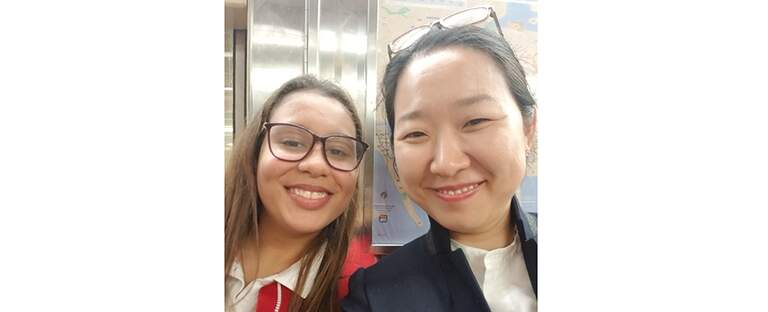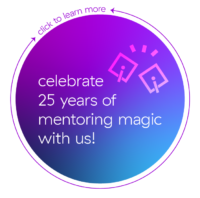The heart of iMentor’s model and mission is building personal relationships. During these uncertain times, we are compelled to help sustain and bolster these connections. In honor of National Volunteer Week, we are featuring a few of our dedicated mentors. Today, we talk to Haemi Lim, a mentor from Barclays with iMentor NYC, about how she’s supporting her mentee, Yesly, in planning for life after high school, and why mentoring has been such a meaningful experience.
What inspired you to volunteer as a mentor?
What inspired me was FOMO! I moved to the States on a four-year work visa and I dreaded the thought of leaving at the end of my stint with vague memories of superficial connections. When you’re told that you’re on limited time, you tend to want to make it count.
Tell me about your mentee.
Yesly is in 10th grade. She’s such a good kid with a good heart. She’s naturally funny and has a generous spirit that really shows when I see the way she cares about her “abue” (her grandmother) or how she treats her friends. High school can be a wretched time, riddled with guises and insecurities, but she navigates it with a kindness and maturity that is rare in teenagers, or grown-ups for that matter. She is an English learner but has not let that affect her studies. She’s a hard worker and super smart. I am really proud of her.
What is your relationship like, and how has it developed over time?
My plan was to be the mature and sensible adult in the relationship, but that fell apart pretty quickly. Most of our interactions involve goofing around and my being very silly. Establishing trust takes time, but it helps if you show your vulnerabilities first. I shared with her mistakes I'd made, and my very many flaws and shortcomings.
I think it was around the 1.5-year mark when she said to me, “I don’t see you as my mentor, I see you as my best friend,” and I almost melted. I don’t think my program manager would approve of that though! I suppose I should remember to be the adult, but I like that we have trust and that she knows she can talk to me about anything.
How have you and your mentee been navigating the COVID pandemic together?
It has been tough as it has been for everyone. She struggles with the focus, the boredom, the separation, in much the same way as we all do. Online learning has been challenging because there are lots of distractions outside of the normal classroom environment, and she doesn't have teachers or friends right by her to ask questions. She is also adamant that teachers are giving them more homework.
We stay in touch via text or calls once a week. We caught up yesterday and talked about her day, the cute actor that’s on the new show she’s watching and worked through a couple of trig questions together. I also try to put things in wider context, that healthcare professionals and other frontline workers are putting themselves at risk so that we can be safe, and even though being quarantined isn’t fun, we have a lot to be grateful for because we are healthy and living in safety with WiFi.
How have you supported your mentee in planning for life after high school?
The main objective of iMentor is college readiness, and of course I want that for Yesly. My hope is also that whatever her life is after high school, she lives it with resilience and confidence. I want her to take on challenges with gusto and be ok with making mistakes. In order to build that mindset, I try to plan our Out-of-Program (OOP) activities to balance fun with doing something that takes her out of her comfort zone. For example, if I agree to sit through a romcom with her, then for our next OOP, she has to try something that makes her nervous, like ice skating or hip-hop dancing.
There was a nine-week coding program offered by Bloomberg, and even though she had no interest in coding, I explained to her that sometimes it’s good to try something even if it doesn’t immediately interest you. We worked on the application together, she secured a spot—the only one in her grade to do so—and she completed the entire program. She still doesn’t want to code, and that’s okay. I’m just proud she stuck with it. There were even some weekend morning classes, which meant not being able to sleep in, and coming into the city on the train on her own. On those days, we would meet up for lunch afterwards and she got to pick, usually McDonald’s or Shake Shack, much to my dismay. I think she’s getting the hang of it. She recently joined the handball team, even though she’s not big on sports. No coaxing from me. Completely of her own volition!
What have you gained from volunteering? How have you grown or what have you learned?
I would say perspective, the kind of perspective you can’t gain no matter how much you read or travel. In terms of what I have learned, this might be an odd answer, but as a foreigner, getting a handle on the U.S. education system was eye-opening. The college process is a minefield and I have a much greater appreciation of the need for educational equality and the importance of putting that thumb on the scale. It’s amazing the sort of ambition and confidence that comes so naturally to those who have the luxury of an economic safety net.
I think it’s so great that we live in a time in which our collective psyche has shifted to value experiences over things. And as far as experiences go, I would say volunteering is pretty hard to beat. New Yorkers are so unbelievably generous and I have met so many people here who are helping their community in one form or another. And for anyone thinking of other ways to get involved, I would really recommend they consider longer term projects like student mentoring. The rewards are far greater than any one-day or short term volunteer work, because it asks more of you. It will make you happier, more empathetic and a better leader.

